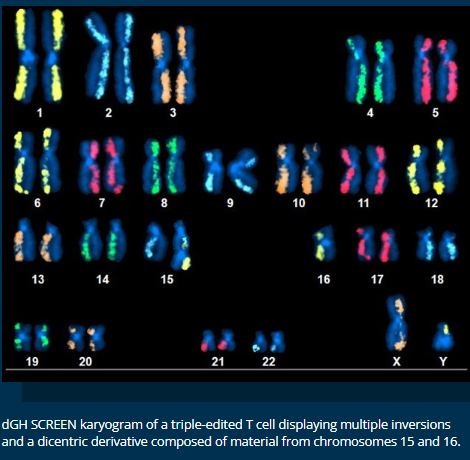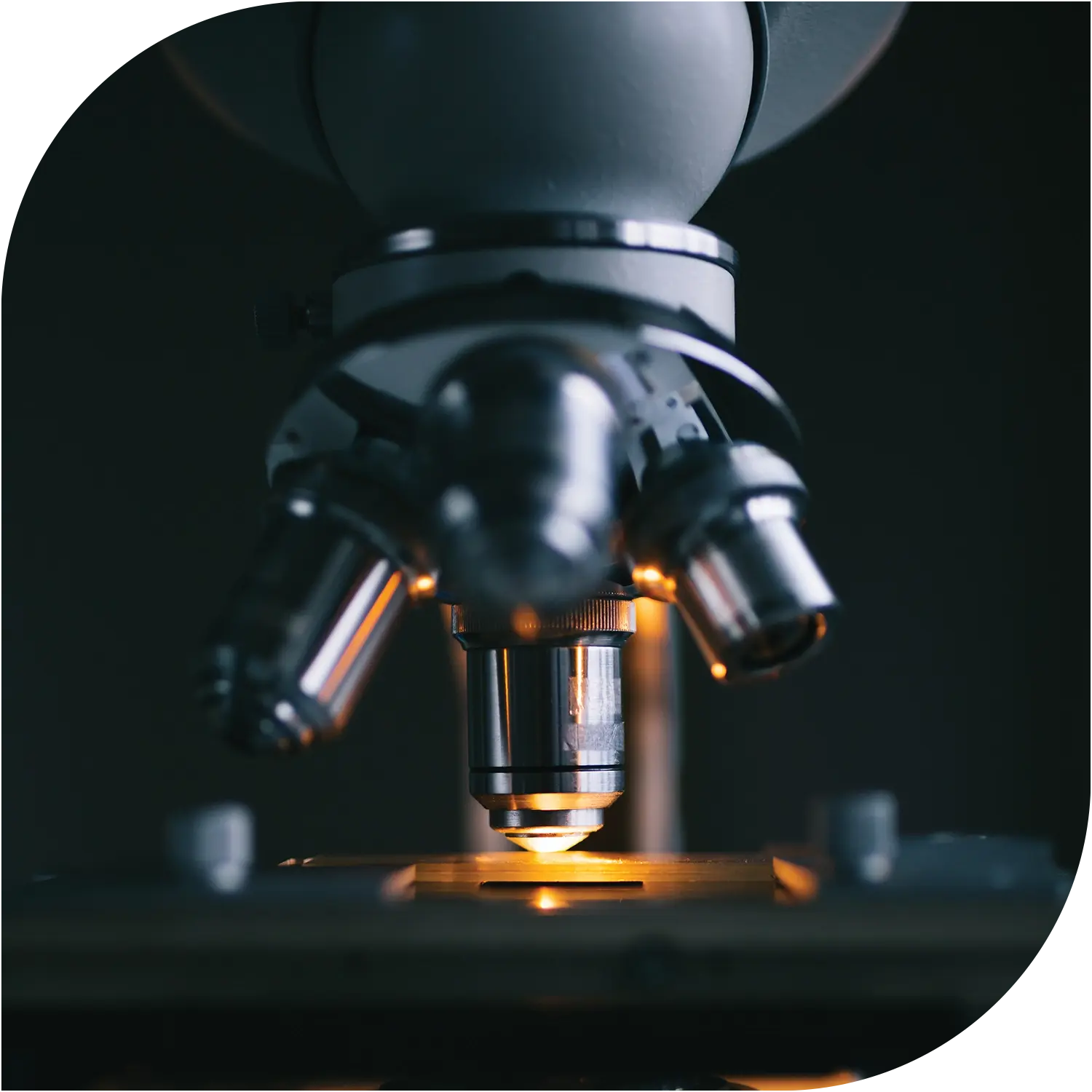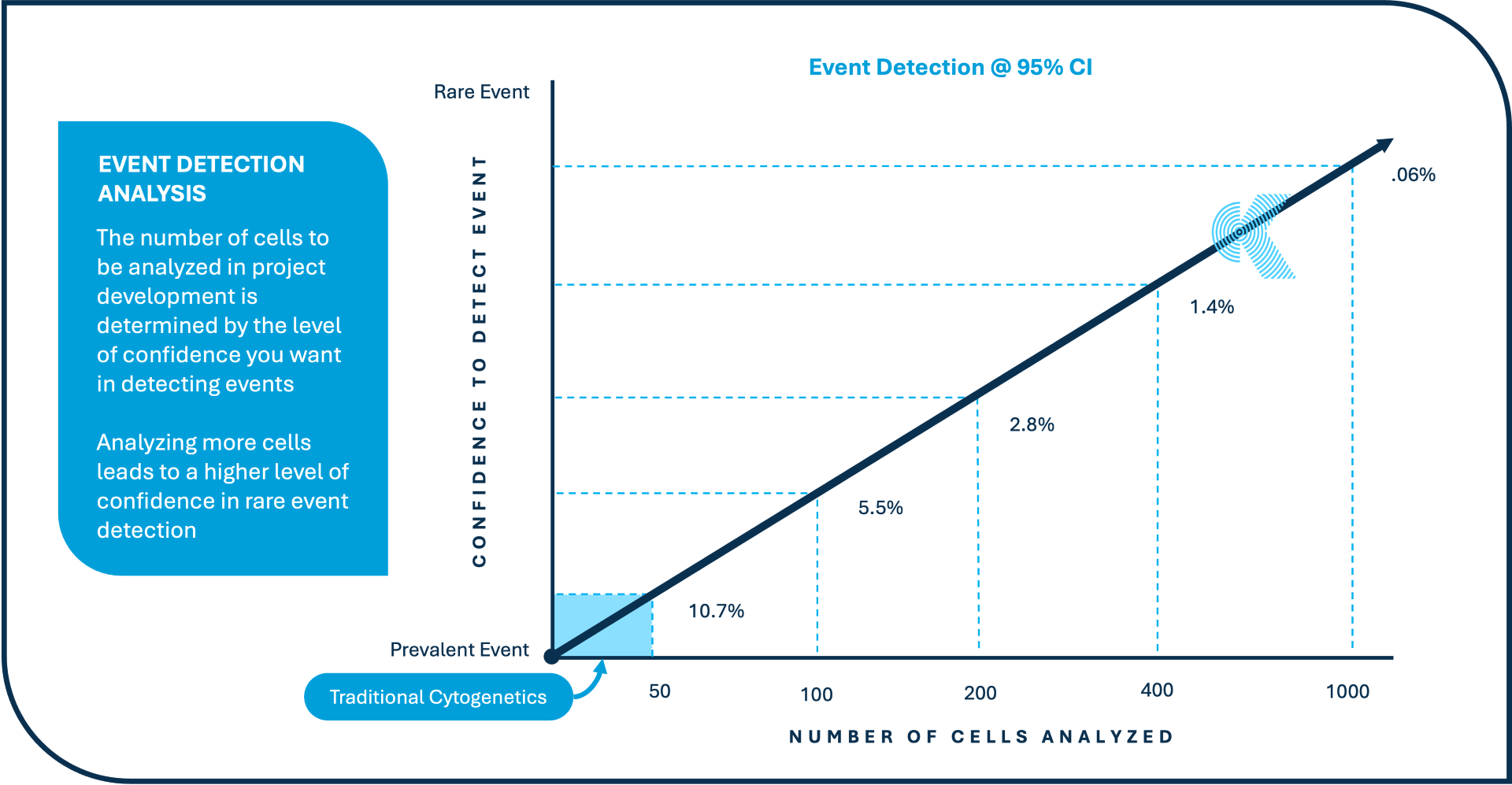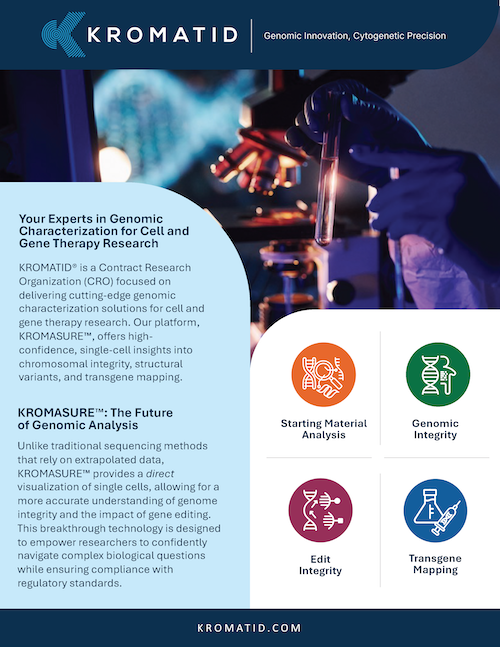The KROMASURE™ Platform
Next Generation Cytogenetics for Cell and Gene Therapy
KROMATID’s KROMASURE™ platform is the genomic
characterization fit-for-purpose solution that provides high-confidence, single-cell insights into
chromosomal integrity, structural variants, and transgene mapping.
Unlike traditional
sequencing methods, our technology directly visualizes up to thousands of single cells
at a time, offering scalable, actionable data with unprecedented clarity, helping you
confidently advance research and meet FDA regulatory requirements.

KROMASURE™ Benefits
- Single-cell analysis: Unlike sequencing methods, KROMASURE™ offers direct visualization of single cells, giving unparalleled insight into genome integrity, chromosomal rearrangement, and the impacts of gene editing.
- Data Integrity: KROMASURE™ technology offers non-extrapolated, fundamental data, which increases confidence, especially for FDA submissions and regulatory reporting.
- High-Confidence Insights: KROMASURE™ technology provides actionable insights into on- and off- target edits, structural variants, and chromosomal integrity with the ability to visualize more than 20 single cells at once, filling the gaps left by traditional analysis methods.
- Scalability and Customization: The KROMASURE™ platform scales to meet evolving needs, offering customized, orthogonal analysis packages for various stages of research and product development.
Learn How Our Solutions Help Meet FDA Recommendations
| Minimize Off-Target Gene Alterations | |
|---|---|
| Orthogonal Redundant Cellular Testing for Unbiased Genome-Wide Analysis | |
| Testing for Clonal Proliferation | |
| Evaluate Genomic Integrity | |
| Cytogenetic Testing | |
| G-Banding Analysis or Other Sensitive Methods |
| Minimize Off-Target Gene Alterations | |
|---|---|
| Orthogonal Redundant Cellular Testing for Unbiased Genome-Wide Analysis |
|
| Testing for Clonal Proliferation | |
| Evaluate Genomic Integrity | |
| Cytogenetic Testing | |
| G-Banding Analysis or Other Sensitive Methods |
|
| Minimize Off-Target Gene Alterations |
|
|---|---|
| Orthogonal Redundant Cellular Testing for Unbiased Genome-Wide Analysis | |
| Testing for Clonal Proliferation | |
| Evaluate Genomic Integrity | |
| Cytogenetic Testing | |
| G-Banding Analysis or Other Sensitive Methods |
| Minimize Off-Target Gene Alterations |
|
|---|---|
| Orthogonal Redundant Cellular Testing for Unbiased Genome-Wide Analysis | |
| Testing for Clonal Proliferation | |
| Evaluate Genomic Integrity |
|
| Cytogenetic Testing | |
| G-Banding Analysis or Other Sensitive Methods |
|
| Minimize Off-Target Gene Alterations | |
|---|---|
| Orthogonal Redundant Cellular Testing for Unbiased Genome-Wide Analysis | |
| Testing for Clonal Proliferation | |
| Evaluate Genomic Integrity | |
| Cytogenetic Testing | |
| G-Banding Analysis or Other Sensitive Methods |
|
[Genome Integrity Assessment]
|

|

|

|

|
|---|---|---|---|---|
| Minimize Off-Target Gene Alterations |
|
|
||
| Orthogonal Redundant Cellular Testing for Unbiased Genome-Wide Analysis |
|
|||
| Testing for Clonal Proliferation | ||||
| Evaluate Genomic Integrity |
|
|||
| Cytogenetic Testing | ||||
| G-Banding Analysis or Other Sensitive Methods |
|
|
Advanced Analytics
Paired with custom analytics and reporting purpose built for cell and gene therapy
analysis the KROMASURE™ platform data is an essential part of any cell and gene therapy
development process from Discovery to Production.

Reporting and analysis includes:
• Comprehensive chromosome structural variation across the genome or at a specific locus of interest
• The number of cells with a transgenic sequence
• Transgene insertional copy number per cell
• Low prevalence tracking of individual structural variants, as well as structural variation phenotypes
• Pair-Wise Comparison Analysis

KROMATID'S Next-Gen Cytogenetics
Here at Kromatid, we believe that visually confirming karyotype across as many cells as possible is essential.
Because when a single cell can pose risk, numbers matter.
Why does conventional cytogenetics miss the mark? It’s really all in the number of cells analyzed. FDA guidance states that visually confirming chromosome integrity with G-Banding analysis or other sensitive methods should be used. And that at very minimum, at least 20 cells should be analyzed to understand mutagenesis risk.
Why only 20 cells? Because conventional karyotyping methods, while they are the gold standard for visualizing chromosomes, are typically run on 20-50 cells. Preparation, imaging and analysis are highly manual and specialized, and analysis for mutation requires highly qualified human expertise examining each chromosome for structural abnormalities.
- Analysis of 20-50 cells will detect chromosome abnormalities present in about 1 out of every 10 cells, or at 10% prevalence. Low-prevalence mutations, will be missed.
- Our mission at KROMATID is to bring the power of these single cell measurements into the hundreds and thousands of cells, which we profile routinely – enabling mutations with 0.1% prevalence can be detected with confidence.

Product Solutions Map


Single Cell Visualization
The KROMATID difference is our singular focus: single-cell visualization and reporting. Unlike other CRO's and labs that spread their expertise across multiple specialties, we dedicate 100% of our efforts to single-cell analysis.
This exclusive focus allows us to serve as an orthogonal confirmation and testing partner for your research and IND submissions.
KROMASURE™ Platform
This data sheet discusses the solutions offered through the KROMASURE platform. Our direct visualization platform can assist in providing clarity on genomic integrity, edit integrity, transgene mapping and starting material analysis.

